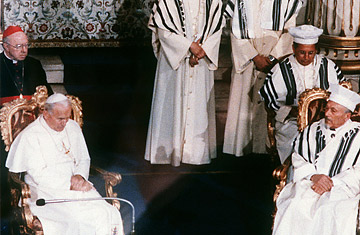
Pope John Paul II in the Grand Synagogue of Rome in 1986.
When Pope John Paul II stepped into Rome's central synagogue on April 13, 1986, the man in white was met by a thunderclap of applause. After centuries of Jews suffering through pogroms, ghettos, Nazi death camps and arm's-length-at-best cohabitation with Christians, the first-ever papal visit to a Jewish house of worship — entering the synagogue side by side with Rome's avuncular chief Rabbi Elio Toaff — was much more than a photo op. It was a shared embrace to begin to heal the wounds of history.
Still, the momentous visit 24 years ago, during which John Paul referred to Jews as Christians' "older brothers," could never fully erase that history. And indeed, when John Paul's successor, Benedict XVI, crosses the Tiber River on Sunday to visit that same synagogue, he will be dogged by a new dispute about the past: the controversy over the Vatican's decision last month to push for possible sainthood for World War II-era Pope Pius XII, whom some Jewish groups and scholars blame for not doing enough to try to halt the Holocaust. Because of this and other tensions in the five years of his papacy, Benedict may be met by slightly more tepid applause from his Jewish hosts.
One of Italy's leading rabbis, Giuseppe Laras, said he would boycott the service, citing a number of sore points with the Pope, most notably his decision to reactivate Pius XII's sainthood dossier, which Benedict himself had put on hold three years ago to await more historical study. "The Pope's visit to the Rome synagogue is a negative fact," Laras, head of the Italian Rabbinic Assembly, told the German-Jewish community newspaper Juedische Allgemeine Zeitung. "[The visit] won't bring anything worthwhile, but will only serve the most reactionary sectors of the Catholic Church."
Other Jewish leaders from around the world have also reacted with consternation at the move toward beatifying Pius XII. Although the naming of saints is an internal matter for Catholics, David Harris of the American Jewish Committee said "the church's repeated insistence that it seeks mutually respectful ties with the Jewish community also means taking our sensitivities into account on the Holocaust era."
Church leaders have sought to reassure their Jewish counterparts both inside and outside of Italy, with some even urging the Vatican to postpone the Pope's long-scheduled visit to the early 20th century Great Synagogue of Rome. The Rev. Federico Lombardi, a Vatican spokesman, said that the "heroic virtue" designation that came with Pius being given the title "venerable" last month — the first step toward his beatification and eventual sainthood — is not a historical verdict but an internal religious evaluation. Lombardi also emphasized how much the church treasures its rapport with the Jews, and said that the study of Pius's war record will continue.
Although he has not personally seen the documents in the Holy See archives, one senior Vatican official tells TIME that he is confident that Pius would not have been elevated to venerable status without solid evidence in the records showing he had tried his best to save Jews during the Holocaust, either by sheltering them or by not issuing a public papal denunciation, which could have just accelerated the killings. "We also need to try to see those events as they were being lived at the time, and be much more understanding about the value in the prudence that was exercised," he said. "History is not that tidy."
Some Jewish leaders, however, are not as upset about Benedict's synagogue visit. Riccardo Di Segni, who took over as Rome's chief rabbi in 2001, has not always seen eye to eye with Benedict. He cancelled a Catholic-Jewish meeting last year after the Pope's decision to allow wider use of the traditional Latin liturgy, which includes a Good Friday prayer calling for the conversion of the Jews. But he and other Jews felt it was better to move ahead with the synagogue visit as planned.
Riccardo Pacifici, president of Rome's Jewish Community, says that the potential upside of the visit outweighs any doubts over whether Pius deserves to be a saint. "We hope the images going out to the world of the Pope coming to a Jewish house of worship ... will send out a signal on the individual level that we can all dialogue with the 'other' with the force of our conscience and our heads held high, and without feeling barriers of fear or prejudice," he says.
While Di Segni has indicated he will speak about the Pius case during the service on Sunday, it is unclear whether Benedict will mention it, or details of his own experience as a teenager in Germany during World War II. In contrast to John Paul's willingness to talk about the war years, Benedict has offered scant recollections of his forced conscription into the Hitler Youth group. "I believe every elderly German has something worth telling Jews, and maybe also asking forgiveness," Pacifici says.
Tulia Zevi, another top Italian-Jewish leader, says that even John Paul's visit to the synagogue 24 years ago was met with some hesitation at first. "There were very mixed feelings, excitement but also skepticism. But we also understood it was a very big event," Zevi recalled. One of the other Jewish leaders who attended that 1986 service will also likely be revisiting his memories this weekend. Toaff was five years older than John Paul when he greeted him on the steps of the synagogue on that spring day. When John Paul died in 2005, the rabbi was one of just two living people mentioned in his last will and testament. At 94, still with a wry smile, Toaff will be there Sunday to help welcome the new Pope. It's possible that in his own way, John Paul will be there, too.
